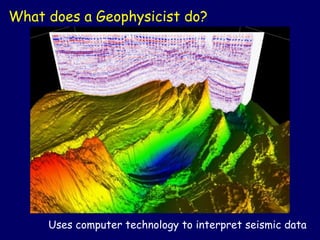All Categories
Featured
Table of Contents
Marine Geophysical Surveys in The Vines Aus 2021
Link with MBA programs seeking candidates like you. Study. Connect with master's programs around the country to get an edge over the competition.

A geophysicist research studies various elements of the earth. Watch a video to learn what a geophysicist: Geophysicists should make a minimum of a bachelor's degree; however, this is for an entry-level position.
If you desire research you must pursue a Ph. D. Undergraduate coursework generally includes geology, mathematics, ecological science, or physics. Postgraduate degree require more specific research studies in the specialty of option. Areas can include oceanography, atmospheric physics, climatology, planetary, petroleum, ecological, and mining. Task prospects are greater if you have a strong background in computer technology or technology.
What Is Geophysics? in Mount Nasura Aus 2023
Access to these opportunities might be limited depending upon where you live; however, internships or summertime programs with geophysical companies, university geophysics department, or the U.S. Geological Study can be alternatives. You can find a list of a list of opportunities on the United States Geological Study (USGS) sites' Pathway Programs tab (opens in another link).
If you have yet to finish high school, taking as lots of science and mathematics classes as possible would be a plus. Geophysicists also work with computer systems while researching, so computer system courses can also be valuable, as mentioned previously in this short article. Lots of geophysicists specialize in an area of geophysics. Therefore, the job description would alter pending on the specialized.
A geophysicist's duties can include determining, tracking, and documenting information from different physical residential or commercial properties on earth. Geophysicists frequently have to take a trip worldwide to analyze geological events that have taken place or may have been anticipated.
Marine Geophysical Surveys in Hazelmere WA 2020
Jay Wellik, a geophysicist, studies volcanos. His area of knowledge in geophysics is looking into why volcanos erupt and what signs there may be that an eruption might happen. He tracks seismic activity and after that follows what happens before, throughout, and after a volcano emerges. Geophysicists usually work full-time hours; however, they frequently work irregular hours, as mentioned formerly.

You can discover additional info about Geophysicists along with additional educational materials on the U.S. Geological Study site (links open in a brand-new window). Laura Stern, of the U.S. Geological Study at the Gas Hydrates Lab in Menlo Park, California: We make a number of various hydrates in the laboratory.
We also make carbon dioxide hydrate, ethane hydrate, lp, a number of different structures. It's about 100 degrees chillier than the temperature level at which these hydrate samples would dissociate, when they would disintegrate to ice plus gas on the tabletop.
Geophysicist - Salary, How To Become, Job Description & ... in Brigadoon Oz 2020
The samples we make, their polycrystalline. They look like snow, it looks like compressed snow however honestly, it does consist of gas inside. Take a little piece off here and as it warms up, you'll begin to see it pop. It's going back to ice plus gas and then as the ice would melt as it continues to warm, it will end up being water plus gas.
My name is Steve Kirby, I'm a Geophysicist here at the U.S. Geological Survey in Menlo Park. I deal with Laura Stern who is also a Geophysicist in this laboratory that is devoted towards the investigation of planetary ices and gas hydrates. Gas hydrates in nature happen in really remote locations and they are extremely intricate with the interactions and conditions that they form under and samples that are brought up are under some sort of alternation or decay.
This is an unusual laboratory and there are just a handful of them worldwide and we are extremely lucky to be here at the Geological Study and to have the chance of dealing with them. Bureau of Labor Statistics, U.S. Department of Labor, Occupational Outlook Handbook, Geoscientists. National Center for O * Internet Advancement.
Environmental Geophysicist in Hazelmere Australia 2020
This video was produced by the government for the U.S. Geological Study. The USGS Gas Hydrates Laboratory is moneyed by the Department of Energy and the USGS Gas Hydrates Project.
Latest Posts
Geological And Geophysical Surveys in Mullaloo Western Australia 2023
Geophysical Surveys & Mapping - Ecs Limited in Rockingham WA 2020
Marine Geophysicist in Iluka Aus 2020